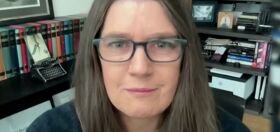
This article is part five of a series of interviews from Sundance Film Festival chronicling the best of indie film for the upcoming year.
Abby McEnany, Tim Mason, and Julia Sweeney enjoy the rapport of old friends, giggling with each other over what to an outsider seems the most trivial of details.
We’ve joined the three at Sundance to discuss their new TV series Work in Progress. Co-created and directed by Mason, the show stars McEnany & Sweeny as two characters who also happen to be named Abby McEnany and Julia Sweeney.
Abby, a butch lesbian suffering from clinical depression and obsessive-compulsive disorder, has suffered life compared to Sweeney’s ebullient character, Pat from SNL. Abby has spent life hating Julia, though when their paths meet, the two form an unlikely bond as Sweeney becomes a friend and moral guide.
How about we take this to the next level?
Our newsletter is like a refreshing cocktail (or mocktail) of LGBTQ+ entertainment and pop culture, served up with a side of eye-candy.
McEnany then finds her long dating drought at an end when she crosses paths with a trans man.
The three have brought Work in Progress to Sundance in hopes of finding a distributor and funding for a second season.
We sat down to chat with them about the show, its themes of dating and gender and the new context for Sweeney’s iconic character.
So Tim & Abby, I’ll start with you since you’re co-creators. How did you two get hooked up?
AM: Actually it’s funny. Tim and I have known each other for about 20 years I think. I met him when I became part of an improv group called Sirens that his wife is in. She was dating Tim at the time. And then, um, I did a storytelling show a couple of years ago that Tim ended up coming to. And we were going to work on some silly little videos. So we talked about it and then he was like how about we just write a little show based on this? And it’s something I’ve always wanted to do. I write because I want to perform, and I don’t know, I’m not a great, what’s it called, auditioner?
[Laughter]
AM: There aren’t a lot of characters that are like me. So I was like, I’ll write it. And I did this storytelling show, and I wanted to do it, but the question is always how do you go to up to somebody that you respect, want to work with, like, love, trust is a huge thing for me—and go “hey, do you want to spend so much time and energy away from your life and family on a story about me?”
AM: I’m sure there are a lot of people that could do it, but I couldn’t. So he came to me, and that’s how it started.
So Tim, you’re a cisgender, straight man…
TM: That is true.
Creating a marvelously queer story. Were you apprehensive?
TM: Absolutely. You know, you’re the first person to ask me that. At the time, it’s funny because these things go from Abby and I having coffee and talking about something we’re going to make and put on the internet, to …now I’m at Sundance and I’m repping an LGBTQ+ story, and I’m a straight, white cis guy. So I’m very self-conscious about it because that’s not my community and I don’t want to speak for anybody else. In fact, two weeks before we filmed…
AM: Mmmhmmm.
TM: I called Abby. And I was like, “Abby, I’ve been thinking about this.” We’d been writing it for two years. We’d even filmed a little teaser for it. And I was like, “I don’t know if I’m the right person to film this.” You know, representation matters. And Abby was like, “Dude, I’ll answer that question if it ever comes up.”

AM: Yeah.
TM: And it’s funny that I’m talking now.
[Laughter]
AM: It’s funny because I was like, “Tim, I can’t make it without you. And if we ever get asked that question, if we ever get to the point where we get to be on a panel and have to answer that question, that’s the only question I feel confident answering.” I’m sorry, but I have been waiting for my whole life to do this. Nobody else came up to help me. This is someone that I trust, and that’s why we’re able to do it. This has been a learning experience, and it’s been a beautiful thing. And I’ve gotta say I’m able to tell this story. We work well together. We’re very different. Like Tim was saying earlier, we have a lot of the same comic sensibilities. But we’re so different as people, and as creators. But I think that comes together beautifully. I think we really compliment each other.
Related: Jake Gyllenhaal goes gay again in ‘Velvet’ and 7 other queer Sundance flicks 2019
TM: I always wanted to tell a love story that I had never made because I come from a more jokey Second City background. I’d always wanted to get into more emotional, moving things. So really, when we were writing it, I just wanted to do a story that moved people emotionally as well as makes them laugh.
Sure.
TM: So, I know for Abby and the people we’ve talked to how important it is to see people that you don’t normally see on screen. As a storyteller, I’m just happy that I got to make a love story between two characters and work with two fantastic actors.
AM: Yeah. That you wouldn’t normally see.
TM: And I think it will affect people no matter what their orientation. This has been one of the greatest experiences of my life.
Absolutely. There’s such honesty to it because it’s not always sweet.
AM: Oh, no.
One of the choices I was really curious about is this idea that you’re sort of playing a parallel universe version of yourself.
AM: Yes.
And so is Julia.
JS: Yes.
What made you want to make that choice, rather than just create a new character that you have a lot in common with?
AM: It’s so interesting. I just think that there are stories to be told that aren’t heard. And maybe people have no interest in my story, and I think that’s fine. But I just think that I don’t see anybody out there—very few people out there—who are telling that story. And it’s funny because I’m a very private person. So I’m a hypocrite, and we’ll talk about that in the show if we get to make more. So it really wasn’t a choice. It was just sort of something that I felt so strongly about, that really resonated with me. So like, I don’t really have 180 almonds at my house.
[Laughter]
AM: So that’s not real, right? But my experience of being called “Pat” is real. And that flashback scene is real. I’ve never confronted Julia Sweeney before, you know what I mean? So there’s fictional stuff there. But I wanted to tell a story about a fat woman, a masculine woman, a queer woman, someone who has a mental illness, and not shy away from that. And struggling with all of that, I want to walk the walk and talk the talk in confronting my own thing. And the whole idea of work in progress is that we’re all works in progress, and we have to talk to each other instead of all this vitriol. We’re all learning.
AM: I don’t know man! That wasn’t very eloquent. But that’s it.

It’s an honest answer. And it also beat me to the next question. Why Julia?
AM: I mean…
JS: Because I ruined [Abby’s] life!
[Laughter]
JS: Who else could ruin her life? I mean, come on.
AM: Oh God.
So wait a second, the Pat story is true? That’s somewhat mortifying…
AM: Yes.
JS: Yes.
So Julia, you got the phone call, “Hi, you’ve ruined my life. Will you do my show?”
JS: A little bit. First I saw what they were working on. Which I thought was so fantastic and so well done. I just fell in love with Abby immediately.
AM: Aww.
JS: I just loved it. I can’t even describe it. But I really feel that way…just the acting—the over the top and subtleness of it all at the same time was brilliant. And then also I feel bad about Pat. I feel bad. I have an uncle named Pat.
[Laughter]
JS: I never even thought I was taking this character on. First of all, I just did it at The Groundlings and never thought anyone would see it. So by the time, it was becoming a big thing, I didn’t understand that. So I just felt bad about my uncle, because he felt bad about it. I didn’t think about people who are androgynous looking or who take on those kinds of qualities and how they’d be affected in a negative way. And then I did realize that only later and felt terrible about it. So it was perfect for someone like me to do something like this because I do feel bad about it. It never even occurred to me.
Well, culturally I don’t know that we thought about it. The big question I had going into this was, “How will they address Pat?” Because I was a kid when those sketches aired, I didn’t know—is the character transphobic? Is it biphobic? Is it non-binary phobic?
JS: Well the original idea of the character in my mind is that Pat is heterosexual and definitely male or female. In Pat’s mind, Pat is 100% female or male. We just don’t know what that is because of how Pat looks. But Pat is never trying to present Pat’s self as nonbinary. Pat just isn’t thinking about how Pat looks at all. That was my original idea, but I don’t feel like I got that out there enough.

What’s interesting is that the joke from the Pat sketches was never Pat herself, it was how everyone else reacted to Pat…
JS: Exactly. Right. See, what was funny to me about Pat at the barber or any of these places is how people saw Pat. I actually have quite radical views myself if you want to do another interview…
[Laughter]
By all means…
JS: Like I don’t think there should be gender-specific bathrooms. I don’t think you should have gender on your passport or driver’s license. And I’ve actually gotten involved with some advocacy over that. I think it’s funny how we have to put people in categories to begin with. I think it’s hilarious how people have to do that. But I really didn’t get that in there. It just became the joke of finding out [Pat’s gender].
One really beautiful thing about this is how you address mental illness. And I say that personally. I think it’s endemic to what we do for some reason. We’re all nuts. But Abby the character has so much to work through but able to find joy in her life…
AM: And that’s all real. I have a very deep depression. I have anxieties and phobias. OCD, but knock on wood, I’ve been doing really well for the past five years.
[Knocks on the table]
JS: But don’t knock on wood again. The recorder…
[Laughter]
AM: I just don’t think there should be shame about it. Like, tell real stories about queer people, about fat people, about older people. We have no reason to hide We have enough things that separate us. Hopefully, once we start talking about things, not everybody’s going to get on board, but let’s take away the stigma. And even with the Julia Sweeney stuff, when Pat came out, I loved it. I only started hating it when lesbians in a lesbian bar would start calling me Pat. It was just like this is my safe space, and this his happening to me? So it was never about Julia, but it happened all the time even if a space that was supposed to be safe for me.
So especially now, with all the vitriol—I use that word a lot—if we take some patience, if we talk to each other, if we stop pre-judging, maybe we can make a little progress.
Work in Progress is currently seeking distribution.

















